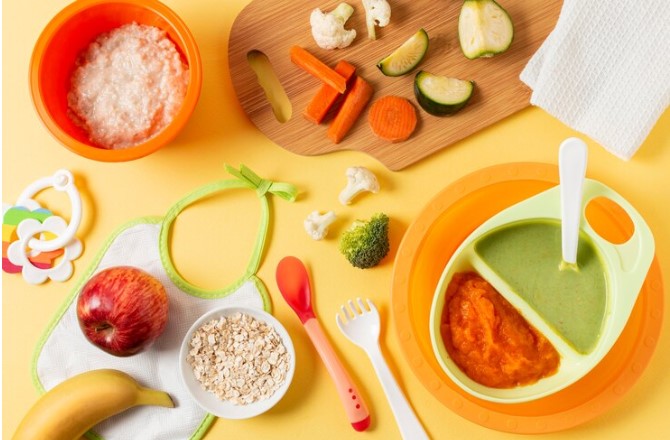In the realm of infant nutrition, the debate between store-bought and homemade Baby Food Recipes has raged for decades. While commercial options offer convenience, homemade baby food provides a unique opportunity to tailor meals to your baby’s specific needs and preferences. By preparing homemade baby food, you can ensure that your little one is receiving the freshest, most nutritious ingredients, free from artificial additives and preservatives.
Benefits of Homemade Baby Food Recipes
- Control over Ingredients: Homemade Baby Food Recipes allows you to have complete control over the ingredients used, ensuring that your baby is consuming only the best quality foods.
- Freshness and Flavor: Homemade food is typically fresher and more flavorful than store-bought options, encouraging your baby to develop a love for healthy eating.
- Nutritional Tailoring: You can customize homemade baby food to meet your baby’s specific dietary needs, whether it’s addressing allergies, sensitivities, or nutritional deficiencies.
- Bonding Experience: Preparing homemade baby food can be a rewarding bonding experience for parents, fostering a connection with your little one.
Understanding Your Baby’s Nutritional Needs
As your baby grows, their nutritional requirements change. It’s essential to consult with your pediatrician to determine the appropriate foods and quantities for each stage of development. Pay attention to your baby’s cues, such as interest in food, gagging, and swallowing ability, to gauge their readiness for new textures and flavors.
Getting Started: Essential Equipment and Ingredients
Before diving into the culinary world of baby food, gather the necessary equipment. A blender or food processor, small bowls and spoons, and ice cube trays are essential tools. When selecting ingredients, opt for organic, fresh produce whenever possible. Avoid using excessive amounts of salt, sugar, or spices, as these can be too strong for a baby’s palate.
Introducing Solids: When to Start and How
The recommended age for introducing solids to your baby varies, but generally, it’s around six months. Begin with single-ingredient purees, such as pureed fruits or vegetables, and gradually introduce new foods one at a time to monitor for any allergies or sensitivities. Start with small portions and observe your baby’s reactions.
how to care with your baby
Nourishing your little one with homemade baby food is a rewarding experience that allows you to control the ingredients and ensure they are getting the best nutrition possible. Here are some delicious and easy-to-make baby food recipes to get you started.
Purees
- Classic Purees: Applesauce, sweet potato, avocado, and banana are excellent starting points.
- Flavorful Combinations: Experiment with combining different flavors, such as carrot and ginger, spinach and feta, or peas and mint.
- Meat-Based Purees: Introduce lean meats like chicken, beef, and turkey gradually.
- Dairy-Free Options: For babies with dairy allergies or sensitivities, explore alternatives like almond milk, coconut milk, or soy milk.
Mashed Foods
- Mashed Fruits and Vegetables: Introduce mashed fruits and vegetables with slightly thicker textures.
- Mashed Meats and Proteins: Continue offering mashed meats and proteins, but with a coarser texture.
- Adding Grains and Dairy: Gradually incorporate grains like rice and oats, as well as dairy products like yogurt and cheese, into your baby’s diet.
Finger Foods
- Soft and Easy-to-Chew Finger Foods: Offer soft foods that your baby can grasp and chew, such as steamed vegetables, soft fruits, and cooked pasta.
- Finger Food Ideas for Toddlers: As your baby’s motor skills develop, introduce more complex finger foods like sandwiches, cheese sticks, and soft-cooked beans.
- Encouraging Self-Feeding: Encourage your baby to self-feed, which can help develop their fine motor skills and independence.
Nutritional Considerations
- Balancing Nutrients: Ensure your baby’s diet includes a balance of proteins, carbohydrates, and fats to support their growth and development.
- Iron-Rich Foods: Incorporate iron-rich foods like fortified cereals, meat, and lentils into your baby’s diet to prevent iron-deficiency anemia.
- Vitamin and Mineral Needs: Consult with your pediatrician to ensure your baby is meeting their vitamin and mineral requirements.
Allergies and Sensitivities
- Common Food Allergies: Be aware of common food allergies in babies, such as milk, eggs, soy, wheat, peanuts, tree nuts, fish, and shellfish.
- Introducing Allergens Gradually: Introduce potential allergens one at a time and monitor your baby for any reactions.
- Signs of Food Allergies and Sensitivities: Watch for signs like hives, swelling, difficulty breathing, or digestive problems.
Tips and Tricks
- Storing Homemade Baby Food: Store homemade baby food in airtight containers in the refrigerator for up to three days or in the freezer for up to three months.
- Freezing Baby Food: Freeze baby food in ice cube trays or silicone pouches for easy portioning and storage.
- Reheating Baby Food: Reheat baby food gently in a saucepan or microwave until warm.
Troubleshooting
- Fussy Eaters: If your baby is picky, try offering a variety of foods and textures. Experiment with different cooking methods and seasonings to make meals more appealing.
- Food Allergies and Sensitivities: If you suspect a food allergy or sensitivity, consult with your pediatrician for guidance.
- Common Feeding Challenges: Address common challenges like food refusal, gagging, or choking by consulting with a healthcare professional.
Additional Resources
- Recommended Books and Websites: Explore books and online resources for more in-depth information on baby food and nutrition.
- Online Communities and Support Groups: Connect with other parents and seek advice from experienced mothers.
- Consulting a Pediatrician: Consult with your pediatrician for personalized guidance and recommendations.
Preparing homemade Baby Food Recipes is a rewarding experience that allows you to provide your little one with the best possible nutrition. By understanding your baby’s needs, following safety guidelines, and experimenting with different flavors and textures, you can create delicious and nutritious meals that will support your baby’s growth and development. Remember, the most important thing is to enjoy this special bonding experience and create lasting memories with your child.







